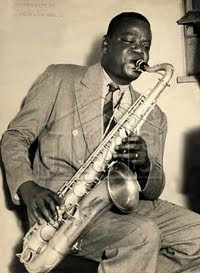K-Ximbinho

K-Ximbinho (Sebastião de Barros, 1917-1980) was a noted Brazilian reed player, composer and arranger. He was a member of Severino Araújo's Orquestra Tabajara, Fon-Fon's orchestra, Sete de Ouro, and the Orquestra Sinfônica Nacional (of Rádio MEC). As a composer, he was one of the most modern creators of the choro idiom, being a pioneer of its modernization with jazz and other rhythmic elements.
K-Ximbinho has several classic choros as part of the repertory of the rodas de choro (choro get-togethers), such as "Sonoroso" (recorded by the Orquestra Tabajara in 1946, as were "Sonhando" that same year, and "Sempre," in 1951). Also part of the repertory of the rodas de choro are his "Ternura," "Mais Uma Vez," and "Kachimbodega". His last composition, "Manda Brasa," won the choro contest II Festival Nacional do Choro/Carinhoso, in 1978. K-Ximbinho also had other significant compositions such as "Eu Quero É Sossego," "Saudades de um Clarinete," and "Gilka."

Saudades de Um Clarinete (LP,1980) (reissued on CD 2003 by Sony Brazil,278156) is the only release dedicated to K-Ximbinho's compositions, arrangements, conducting, and performance. The cd has big band arrangements as well as small combo readings of K-Ximbinho's compositions, displaying great performance by all involved. Tracklist and info on personnel inserted below.
Tracklist:
1. Eu Quero É Sossego; 2. Sempre; 3. Meiguice; 4. Tô Sempre Aí;5. Gilca; 6. Mais Uma Vez;7. Velhos Companheiros; 8. Penumbra; 9. Simoninha Na Barra; 10. Ternura; 11. Alto Plágio;12. Catita
1. Eu Quero É Sossego; 2. Sempre; 3. Meiguice; 4. Tô Sempre Aí;5. Gilca; 6. Mais Uma Vez;7. Velhos Companheiros; 8. Penumbra; 9. Simoninha Na Barra; 10. Ternura; 11. Alto Plágio;12. Catita
Personnel:
K-Ximbinho (cl), Zé Bodega (cl, sax solo), Edson Antonio Marin (p), Edgar Nunes (dm), Antonio Augusto V. B. de Magalhães (b), Daudeth de Azevedo (cavachinho), Rafael Rabello (Violão de 7 Cordas), Jorginho (pandeiro), Jessé Sadoc (tb), Heraldo Reis (tp), Quinteto de Saxs: Dulcilando Pereira, Alberto Vianna Gonçalves, Ademir Gomes, Clóvis Timóteo Guimarães, Hélcio Jardim Brenha. Quinteto Villa-Lobos: Carlos Seabra Rato, Eros Martins de Melo, Paulo Sérgio dos Santos, Carlos Gomes de Oliveira, Airton Barbosa
K-Ximbinho (cl), Zé Bodega (cl, sax solo), Edson Antonio Marin (p), Edgar Nunes (dm), Antonio Augusto V. B. de Magalhães (b), Daudeth de Azevedo (cavachinho), Rafael Rabello (Violão de 7 Cordas), Jorginho (pandeiro), Jessé Sadoc (tb), Heraldo Reis (tp), Quinteto de Saxs: Dulcilando Pereira, Alberto Vianna Gonçalves, Ademir Gomes, Clóvis Timóteo Guimarães, Hélcio Jardim Brenha. Quinteto Villa-Lobos: Carlos Seabra Rato, Eros Martins de Melo, Paulo Sérgio dos Santos, Carlos Gomes de Oliveira, Airton Barbosa
Alvaro Neder writes a career profile in AMG:
He was interested in music early on and learned solfeggio, theory, and clarinet with a band master in his home town. In Natal, to where he moved with his family, he started to play with the amateur jazz band Pan Jazz. During his military service, he also took the saxophone and from 1938 to 1942, he was a member of the Severino Araújo's Orquestra Tabajara. In this latter year, he moved to Rio de Janeiro where he played with Fon-Fon's orchestra, having been the clarinet soloist on a recording of "Maria Helena" with Francisco Alves. In 1943, he became a member of the Napoleão Tavares orchestra. From 1945 to 1949, he joined again the Orquestra Tabajara. In 1946, the Orquestra recorded his classic choro "Sonoroso" (his first recorded composition). In 1949, he played in the orchestra for Rádio São Paulo. In Rio, he was hired by Avenida Dancing, and two years later by Rádio Nacional. From 1951 to 1954, he studied harmony and counterpoint with Hans Joachim Koellreutter and in 1954, he toured Europe. After his return, he worked as an arranger for Odeon and TV Globo (where he was the second alto in a section with masters Netinho, Biju, Walter Rosa, and Januário), also playing in other nightclubs like Sacha's. From 1965 to 1968, he was a member of the group Sete de Ouro, also having become a member of the Orquestra Sinfônica Nacional.
Jo



0 Comments:
Post a Comment
<< Home